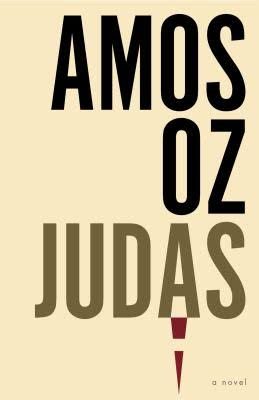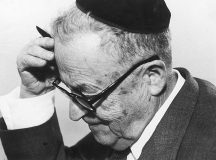Amos Oz was 14 when, two years after his mother took her own life, he left the city of his birth, Jerusalem, for Kibbutz Hulda. Born and raised in a tiny, ground floor flat that was lined with books and cold in winter, Oz and his friends would go to the Tnuva delivery yard to watch the new Jews, ‘tanned, tough, silent practical breed of men…totally unlike the residents of Kerem Avraham’, arrive and unload their wares. Oz writes in A Tale of Love and Darkness, ‘I secretly dreamed that one day they would take me away with them.’
Never again would Oz live in Jerusalem. He would return in his dreams and the pages of his novels, most famously My Michael, whose principal character Hannah Gonen has all the intelligence, romanticism, and melancholy of his mother. Fima – one of Oz’s finest novels – examines Jewish restlessness in the time of statehood, while The Hill of Evil Counsel and Panther in the Basement take us back to the Jerusalem of Oz’s childhood, at the time of Israel’s founding. Now, with his unsettling and engaging new novel Judas, we return to once more to the city of peace.
‘Here is a story from the winter days of the end of 1959 and the beginning of 1960’, Judas begins. ‘It is a story of error and desire, of unrequited love, and of a religious question that remains unresolved.’ This is a divided Jerusalem, where ‘the buildings still bore the marks of the war’ of 1948 and ‘in the background you could hear the distant strains of an accordion, or the plaintive sound of a harmonica from behind closed shutters’. Amidst it all is Shmuel Ash, ‘a stocky bearded young man of around twenty-five, shy, emotional, socialist, asthmatic, liable to veer from wild enthusiasm to disappointment and back again.’
Shmuel’s life in Jerusalem has hit something of a dead end. He has abandoned his Master’s thesis on Jewish views of Jesus, which he was undertaking at the Hebrew University. There’s been a schism in the Socialist Renewal Group, a tendentious cell of which he is a part, following revelations of the crimes of Stalinism in Nikita Khrushchev’s secret speech. And his girlfriend, Yardena, has decided to leave him and to accept a proposal of marriage from her previous boyfriend, a hydrologist named Nesher Sharshevsky.
Unable to support himself, preparing to leave Jerusalem, Shmuel finds a notice pinned on a board at the university. The offer is of free accommodation and a monthly stipend,’in return for spending five hours per evening with a seventy-year-old invalid, an educated, widely cultured man.’ Shmuel locates the house at the foot of a slope in Sha’arei Hesed. It feels narrow and sunken, its gates rusted and frontage blazed with geraniums in red, white, pink, and purple. As he enters, ‘his nostrils caught a pleasant smell, a smell of fresh laundry, of cleanness, of starch and ironing’.
The property is home to the elderly, discursive shut-in Gershom Wald, and a woman of middle-age named Atalia Abravanel, whose fragrance is one of violets. They live together but apart: Gershom in one room, Atalia in another. Their relationship, to Shmuel, is unclear, but he accepts the offer of room and board. Every evening from five o’clock until late, he must sit with Gershom over tea, converse and argue with him on whatever subjects take Gershom’s fancy, and at a certain point, prepare him his evening meal of porridge with sugar and cinnamon. Otherwise, Shmuel is free to come and go as he pleases and to read and write in his room in the attic.
Once this set up is established, and the shape of Oz’s novel formed, it narrows its focus and hones in on its subjects: love, loneliness, dreams, grief, and treachery. Reengaged to a certain extent in his reading, Shmuel’s attention drifts away from Jesus to Judas, developing the theory that ‘Judas was the most loyal and devoted of all his disciples and that he never betrayed him but, on the contrary, he meant to prove his greatness to the whole world’. He was, to Shmuel, not a traitor but the first and last true Christian, whose devotion to and belief in the Nazarene was without question.
This development occurs parallel to his discovery that Atalia is the daughter of Shealtiel Abravanel, a creation of Oz’s, who opposed David Ben-Gurion at the time of the establishment of the state, favouring an alternative solution that would beget a peaceable solution and cohabitation between Jews and Arabs. He resigned from the Zionist Executive Committee and the Council of the Jewish Agency in December 1947, and henceforth considered a traitor, lived out his days in a form of self-imposed internal exile, in his home in Sha’arei Hesed.
‘He didn’t belong in our time’, Atalia tells Shmuel. ‘He may have come too late. He may have been ahead of his time. He belonged in a different time.’ As Gershom says of Atalia’s father, ‘Blessed are the dreamers, and cursed be the man that opens their eyes.’ While Shmuel learns more about Shealtiel Abravanel, and uncovers more about the exact nature of the ties that bind Gershom and Atalia, he becomes more and more infatuated with this beguiling older woman. ‘Don’t fall in love with her’, Gershom warns him, before recognising, ‘It’s too late.’ It is a love that will be Shmuel’s undoing.
Here, then, in this house on Rabbi Elbaz Lane in Sha’arei Hesed, are confined three outcasts: the grieving invalid trapped behind four walls; the beautiful, aloof woman who feels her country betrayed her father; and the lost boy waiting to be found. As it was for Shealtiel Abravanel before them, it is a house of exile, removed from the city of Jerusalem as much as it is defined by it. With Judas, Oz has given us a thoughtful and multifarious novel, emotionally and intellectually complex, told in a narrative style that is, in turns, bewitching and disconcerting. It is a novel of questions as much as it is a novel of ideas, which asks what it means to be a traitor and what it does to those who suffer when branded with this marker.





































Amos Oz’s ‘A Tale of Love and Darkness’ is a masterpiece. C’est tout.